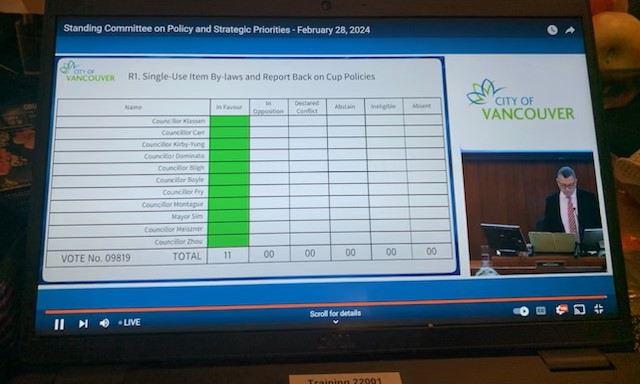In December 2023, the federal government brought into force its country-wide ban on single-use plastics which includes plastic straws. That has been a huge issue for many people in the disability community who use flexible plastic straws every day to drink. They aren’t just a straw, they are a neccessity.
In 2020, the City of Vancouver enacted its own ban on single-use plastics which included a caveate for accessiblity. Flexible plastic straws could be made available upon request at local restaurants and vendors. Because of that clause, the City’s by-law is now in contravention of the federal rules.
Now, with a push from DDA and other groups that support people with disabilities, the City is going back to the federal government to insist that it change it’s current ban when it comes to plastic straws. On February 28th, Vancouver City Council voted to write to the Federal Minister of Environment and Climate Change Canada in order to make the national plastic straw ban as accessible as the City of Vancouver’s by-law was.

DDA’s Assistant Director of Residential Services, Tasia Alexis, was part of the groundswell that got the City to move forward on this issue.
“The use of flexible plastic straws allows persons with disabilities to have full access to eat and drink by removing barriers and restrictions on how they consume their food,” says Alexis. “We are proud that the City of Vancouver has worked very hard in developing its Accessibility Strategy. It contributes to the City’s equity lens to support the physical, mental, emotional, and social health of its citizens.”
For people with disabilities, accessibility often means having the necessary tools and accommodations to navigate the world independently. Flexible plastic straws play a crucial role in achieving this goal by enabling individuals with various mobility and dexterity challenges to drink independently.
What many people take for granted, is the ability to simply hold a cup. Impairments such as muscular dystrophy or spinal cord injuries can make holding and maneuvering a standard cup or glass difficult or impossible. Many people in the developmental disability community face similar fine motor skill issues. Flexible plastic straws provide the flexibility needed to adjust the angle and position of the straw, allowing individuals to drink comfortably and safely.
Flexible plastic straws also offer a hygienic and safe solution for individuals with compromised immune systems or specific medical needs. Unlike reusable straws, which require thorough cleaning and sanitation between uses, disposable plastic straws reduce the risk of contamination and infection.
“We also want to ensure that the straws are visible and available to purchase in regular stores and not hidden out of sight,” adds Alexis. “We don’t want them to become medicalized and only available in pharmacies and medical supply stores.”
While the rest of us should be compelled to use alternatives like cardboard or reusable metal straws, we are grateful the City is trying to urge the federal government to change part of its all out ban on plastics for the benefit of people with disabilities.



